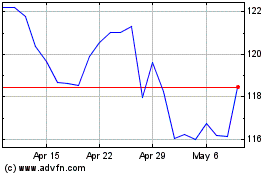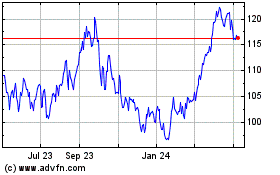By Sarah Kent And Amy Harder
LONDON--The chief executives of Royal Dutch Shell PLC and
ExxonMobil Corp. laid out contrasting visions this week for
reducing fossil-fuel emissions, illustrating a divide between
American and European energy companies ahead of a United Nations
climate-change summit.
Rex Tillerson, CEO of U.S.-based Exxon, said Wednesday that
innovation, free markets and competition were the best tools for
curbing emissions. His remarks came a day after Ben van Beurden,
chief of Anglo-Dutch giant Shell, said technology wouldn't be
enough to bring about emissions cuts, and that governments needed
to step in.
Both executives were speaking here at the Oil and Money
conference, co-hosted by Energy Intelligence and the International
New York Times.
The differing messages show that the oil industry hasn't come up
with a unified response to climate change, even as its leaders
become increasingly vocal about it in the run-up to the U.N. summit
in Paris. Nearly 200 countries are expected to participate in the
Nov. 30 to Dec. 11 meeting, which is designed to hammer out a way
to reduce carbon emissions enough to slow climate change.
Messrs. Tillerson and van Beurden agreed on many issues,
including that renewable-energy sources like solar can't meet the
demands of a quickly industrializing world with a growing
population. Both also would back putting a price tag on carbon
emissions, an idea expected to be discussed in Paris, but Mr.
Tillerson's support was more qualified.
Mr. van Beurden, like many of European energy executives, was
more explicit in calling on governments to intervene, and "take the
opportunity to put a price on carbon." "By taking the costs of
tackling climate change and air pollution into account,
carbon-pricing systems will drive the right behavior of consumers
and producers," Mr. van Beurden said.
Mr. Tillerson took a different stance, saying technological
advances launched the American shale boom, producing an abundance
of natural gas that has helped curb U.S. emissions. "We've proven
that with the right policies in place the competition and
cooperation inherent in free markets will spur us to invest and
innovate," Mr. Tillerson said.
Those reductions, he said, were made without a U.S. policy on
carbon pricing. Mr. Tillerson said he would accept a carbon tax if
it was "revenue neutral," which, according to Exxon's website,
means it would be "offset by tax reductions in other areas."
The divergence between American and European energy executives
in their approach to climate change has played out elsewhere this
year.
The chiefs of the biggest European oil companies signed an open
letter in June calling for a carbon-pricing system to be instituted
globally. Mr. van Beurden, who helped coordinate the letter, said
American companies were invited to join, but declined.
"They probably came from a different point at that stage," Mr.
van Beurden told The Wall Street Journal in a June interview. He
played down any rift with American counterparts.
The American Petroleum Institute, which represents hundreds of
U.S. oil and gas companies, including Exxon, Chevron Corp., and
European companies like Shell, didn't sign the letter.
"We have members with differing views across the entire
spectrum," Jack Gerard, the trade group's president and CEO, said
in an interview Wednesday. "But our view is that the issue is a
serious one that needs to be addressed."
Mr. Gerard said he was still talking with member companies about
making statements ahead of the Paris summit or attending the
talks.
American companies don't plan to participate in meetings next
week in Paris among European energy companies including Shell, BP
PLC and French oil giant Total SA and state-oil companies from
Saudi Arabia and Mexico to discuss climate-change initiatives.
The oil industry for years has grappled with how to address
environmental issues. The Bank of England's governor, Mark Carney,
warned in a speech last month that investors could face huge losses
if tough climate-change policies are enacted that could make vast
reserves of oil, gas and coal "literally unburnable."
It's a threat the large oil companies deny, saying that rising
energy use in coming years will keep oil and natural gas a vital
part of the energy mix.
In fact, for the European energy companies, supporting new costs
on carbon would make sense if the system hurt the coal industry to
the benefit of cleaner-burning natural gas. Some companies like
Shell produce more gas than oil.
U.S. energy companies have generally been more averse to climate
taxes than their counterparts in Europe, where carbon is already
taxed. The U.S. doesn't currently tax carbon emissions.
In a speech last year at the Economic Club of Minnesota, Chevron
CEO John Watson said free markets support environmental objectives
by creating a strong economy better able to fund environmental
priorities. Policy makers should "override free-markets only in
extreme circumstances. I can think of few cases where American
consumers have been well-served by usurping markets."
Write to Sarah Kent at sarah.kent@wsj.com and Amy Harder at
amy.harder@wsj.com
Access Investor Kit for "Royal Dutch Shell PLC"
Visit
http://www.companyspotlight.com/partner?cp_code=P479&isin=GB00B03MLX29
Access Investor Kit for "Royal Dutch Shell PLC"
Visit
http://www.companyspotlight.com/partner?cp_code=P479&isin=GB00B03MM408
Access Investor Kit for "EXXON MOBIL CORP"
Visit
http://www.companyspotlight.com/partner?cp_code=P479&isin=US30231G1022
Access Investor Kit for "Royal Dutch Shell PLC"
Visit
http://www.companyspotlight.com/partner?cp_code=P479&isin=US7802591070
Access Investor Kit for "Royal Dutch Shell PLC"
Visit
http://www.companyspotlight.com/partner?cp_code=P479&isin=US7802592060
Subscribe to WSJ: http://online.wsj.com?mod=djnwires
(END) Dow Jones Newswires
October 07, 2015 20:05 ET (00:05 GMT)
Copyright (c) 2015 Dow Jones & Company, Inc.
Exxon Mobil (NYSE:XOM)
Historical Stock Chart
From Mar 2024 to Apr 2024

Exxon Mobil (NYSE:XOM)
Historical Stock Chart
From Apr 2023 to Apr 2024
